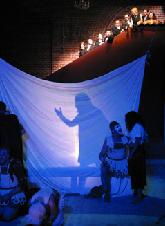SITE GUIDE
REVIEWS
FEATURES
NEWS
Etcetera and
Short Term Listings
LISTINGS
Broadway
Off-Broadway
NYC Restaurants
BOOKS and CDs
OTHER PLACES
Berkshires
London
California
DC
Philadelphia
Elsewhere
QUOTES
On TKTS
PLAYWRIGHTS' ALBUMS
LETTERS TO EDITOR
FILM
LINKS
MISCELLANEOUS
Free Updates
Masthead
Writing for Us
A CurtainUp Los Angeles Review
Love's Labor's Lost
By Ariana Mufson
|
And how can that be true love which is falsely attempted? Love is a familiar; Love is a devil; there is no evil angel but love
--- Armado, sick with love for Jacquenetta |

Scene from Actor's Gang production of Love's Labor Lost.
|
The production has clearly been influenced by Arianne Mnouchkine's Theatre du Soleil, of which Abkarian was a member in Paris, a company which as noted in the show's press notes is known for interspersing modern theater techniques with masks, music and, movement. A white scrim hangs center stage and is used both as a prop and visual technique, as the actors duck behind to become silhouettes, almost like a puppet show.
The first scene reveals the plot quite clearly. An announcement echoes throughout the theater, briefing us on the king's new edict: no women shall be allowed within the gates of Navarre--or else. Ferdinand, the king of Navarre, and his three lords must devote themselves to intellectual pursuits for three years and forswear the company of women. Of course, the King has forgotten that a Princess from France will be visiting them to discuss her sick father's land, to which Ferdinand has claim. The setting is ripe for a power-play between the men and women, who are confronted with issues of truth and love. The men must grapple with their desires and their oaths, whereas the women must decide whether to accept men with such fickle convictions.
Abkarian firmly roots the play in a Spanish setting, with a beautiful set and lighting design to complement the exquisite costumes. The wonderful score, with live guitar and accordion, furthers our entrance into his world. At the first meeting between the King and the Princess we glimpse Abkarian's mastery of tableau -- the men in black greet the women in white, adorned with sunglasses, who quickly take an upper hand. The two groups slowly circle one another and avoid the forbidden touch. Still, the scene is almost somber and the movements methodical. Though Abkarian creates beautiful visuals the emotional tension isn't as palpable.
The entrance of the love-sick Spaniard Armado, a hilarious Robert Shampain, gives the show life. Later still, the direction shines during an amusing and well choreographed brawl. Nevertheless, the first act languishes, and although our attention is captivated by the different visual formations, we are not drawn in by the usual quick banter that is Shakespeare's style. One wishes that the first act had been closer to the length of the second, which is worth the wait, as the king and his men pretend to be Russian travelers. When the princess and her ladies fool them by switching identities and meeting for a Russian dance, the stage is finally filled with movement and spectacle which dazzles and delights.
The pace of the show is its greatest weakness as it leaves even this seasoned Shakespeare aficionado weary. By play's end, however, the chemistry and physical attraction between the pairs, especially standouts Berowne (Brian Kimmet) and Rosaline (Sabra Williams), allow us to finally feel the conflicted emotions of the lovers, separated by their own edicts. Despite a sometimes awkward combination of realism and commedia dell'arte, the actors manage to bring depth and passion to their roles. The acting is of such universally high caliber that we are compelled to stay with the show until its beautiful, if slightly melancholy, conclusion.
LINKS
To read Laura Hitcock's interview with Simon Abkarian go here
For reviews of other productions of Love's Labor's Lost and other Shakespeare playsgo here
| Love's Labor's Lost Playwright: Shakespeare Director: Simon Abkarian Cast: Pierre Adeli, Angela Berliner, Matt Huffman, Brian Kimmet, Ethan Kogan, Mary Eileen O'Donnell, Robert Shampain, Shana Sosin, Nancy Stone, Toni Torres, Daisuke Tsuji, Lolly Ward, Andrew E. Wheeler, Sabra Williams, Josh Zeller and Justin Zsebe Set Design: Francois-Pierre Couture Costume Design: Sarah Le Feber Lighting Design:Francois-Pierre Couture Sound Design: Craig Michaels Music Composed and Performed by: Ara Dabandjian Running Time: 2 hours and 38 minutes not including a 15 minute intermission Dates: From July 22 to September 16, 2006. Thursdays, Fridays and Saturdays at 8 pm and Sundays at 2:00 pm. The Actor's Gang Ivy Substation 9070 Venice Boulevard Culver City, CA 90230 Tickets: Fridays through Sundays $25, Thursday night performances are Pay-What-You-Can. Call 310-838-GANG (310-838-4264) or www.theactorsgang.com Reviewed by Ariana Mufson on 7/22/06. |
The Internet Theatre Bookshop "Virtually Every Play in the World" --even out of print plays
The Internet Theatre Bookshop "Virtually Every Play in the World" --even out of print plays

